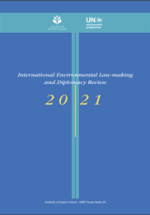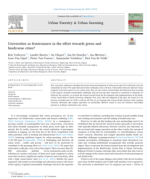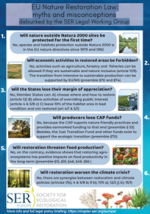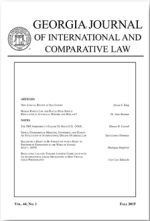
International Environmental Law-making and Diplomacy Review 2021, Tuula Honkonen (editor), University of Eastern Finland – UNEP Course Series 20, 2023, 1-32.
An Cliquet examines the international law on restoration. Her analysis shows that an evolution can be discerned in the existing international law in this respect, from a rather implicit attention for restoration to a gradually more extensive and explicit attention for restoration. Nevertheless, gaps still exist in the current international regime on restoration: there is lack of clarity on how and where to restore; a too narrow focus on restoration of protected areas; and a lack of concrete and binding qualitative and quantitative targets for restoration in and outside protected areas. She then discusses three recent initiatives that could potentially ameliorate the current situation with regard to the international law on restoration: the UN Decade on ecosystem restoration; developments within the global biodiversity framework; and the proposal for an EU nature restoration law. She concludes that the discussed initiatives could be promising to accelerate the commitments and implementation of restoration at global level. Furthermore, a new legal principle of restoration could, over time, help to upscale restoration activities.

Kris Verheyen, Lander Baeten, An Cliquet, Jan De Doncker, Jan Mertens, Leen Van Gijsel, Pieter Van Vooren, Annemieke Verbeken, Riet Van de Velde, Urban Forestry & Urban Greening 81 (2023) 127872
How can policy ambitions regarding the preservation and expansion of urban green space be turned into concrete realisations in cities? We argue that universities could play a key role here. Universities often not only have large campuses with green spaces in core urban areas, they are also centers of knowledge and education that can point to the urgency of global sustainability challenges and can leverage their expertise to contribute to solutions. To illustrate this position, we present the lessons learned from the development and implementation of the Biodiversity Action Plan at Ghent University, Belgium. Four years after the adoption of the plan, the target of a net increase in biodiversity by 2030 is still far off. But we are learning that living lab-like initiatives that combine research, education and campus operation are potentially effective arenas to turn the extensive knowledge present in academic institutions into action.
EU Nature Restoration Law: myths and misconceptions debunked by the SERE Legal Working Group, May 2023
There are a lot of misconceptions on the EU nature restoration law proposal. Several of these misconceptions have been debunked by the Legal Working Group on restoration. For a legal analysis, see SERE Legal Working group, The EU Nature Restoration Law: Providing legal certainty in tackling the biodiversity and climate crisis, May 2023, available at https://serchapter2018.wpenginepowered.com/europe/files/2023/05/EU-Natur...
For a broader legal assessment of the law, see SERE Legal Working Group, Legal assessment of the Proposal for an EU Nature Restoration Law, April 2023, available at: https://chapter.ser.org/europe/files-2023-04-sere-legal-working-group-as...
(2023) 51 3 Ga. J. Int'l & Compar. L.
The FSR and the FDI screening mechanism are just two examples of a much broader set of new tools intended to strengthen the EU’s hand in the evolving geo-economic confrontation. The purpose of this Article, however, is not to exhaustively map all relevant EU instruments. Rather, it focusses specifically on three tools that raise pressing questions from an international law perspective, critically examining how they fit within the international legal framework, and what they reveal about the EU’s place therein. These tools are the revised Trade Enforcement Regulation, the revised EU Blocking Statute, and the new “Anti-Coercion Instrument” (ACI).
SERE Legal Working Group, Legal assessment of the Proposal for an EU Nature Restoration Law, April 2023.
SERE Legal Working Group, The EU Nature Restoration Law: Providing legal certainty in tackling the biodiversity and climate crisis, May 2023.
SERE Legal Working Group, Legal assessment explaining why COPA*COGECA's objections against the Nature Restoration Act proposal are misleading, July 2023.
(2023) OCEAN YEARBOOK. 37(1). p.194-206.
The status of the Area and its mineral resources as the common heritage of mankind constitutes the guiding principle of the international deep seabed regime. Although its implications and objectives are wide-ranging, one of the crucial components of this abstract concept consists of a general premise to carry out activities in the Area for the benefit of mankind as a whole. This ambition can be pursued through various mechanisms, and one of the most direct ways is to share the proceeds of deep sea mining among all states on an equitable basis. In accordance with the UN Convention on the Law of the Sea, the International Seabed Authority (ISA) is tasked with developing a suitable payment and distribution system, which takes the needs and interests of developing states into particular consideration. This article analyses the overarching rules and principles, discusses prominent issues and evaluates the available options, offering an insightful look at a complex process which will shape some of the most important aspects of the international deep seabed regime.
(2023) The evolution of the law of the sea : celebrating AssIDMer’s 20th anniversary. In Cahiers de l’Association Internationale du Droit de la Mer 11. p.165-174.
Together with its mineral resources, ‘the Area’ – comprising the seabed and subsoil beyond the boundaries of national jurisdiction – is designated as the ‘common heritage of mankind’. This abstract concept, indirectly derived from the legal notion of ‘res communis’, provided a solution for several issues surrounding the anticipated exploration and exploitation of the deep seabed resources. Indeed, it reconciles the conflicting ambitions of exploitation and conservation and serves to avoid a ’tragedy of the commons’ scenario, as the absence of an specific management regime would pose a significant risk of unbridled exploitation and drastic ecological decline. Nevertheless, one of the predominant motivations behind the principle of the common heritage of mankind was to ensure fair sharing of the benefits derived from the Area by preventing a first-come first-serve race to the bottom of the ocean, which would mainly entitle developed nations – possessing the necessary expertise, technology and financial means to engage in deep sea mining – to the mineral resources of the deep seabed and would exclude most developing states from these economic opportunities. This important objective ought to be implemented through a number of mechanisms (including the establishment of the Enterprise, the system of reserved areas and the adoption of equitable sharing procedures), but most of these have not yet been operationalized by the International Seabed Authority or seem to be undermined by current developments. This reveals an apparent imbalance between two of the main ambitions associated with the common heritage of the mankind: while the prominent focus on marine environmental protection and the widespread scrutiny in this regard is appropriate, since the precise impact of seabed mining on deep sea ecosystems remains largely unknown and is a major concern, the seeming neglect of the interests of developing states in the Area and the lack of urgency to address these issues should not be overlooked.
(2023) Routledge handbook of seabed mining and the law of the sea. In Routledge Handbooks in Law p.345-350.
The role of Belgium within the context of seabed mining cannot be underestimated, as the Belgian company Global Sea Mineral Resources plays a pivotal part in the development of seabed mining technology in the Clarion-Clipperton zone. Belgian companies are worldwide leaders in dredging and beach nourishment, and due to this specific expertise, Belgium is also active in the Area. In 2019, the Belgian government concluded that certain aspects of the Belgian legislation on seabed mining activities in the Area could be improved and should be more aligned with the future exploitation regulations of the ISA. Mining activities on the Belgian continental shelf require a concession, while applications to the ISA for seabed mining activities in the Area necessitate a certificate of sponsorship. The Belgian seabed mining legislation adheres closely to the international conventions and ISA regulations, but in order to prepare for the exploitation phase and enact several improvements, legislative reforms are underway.




